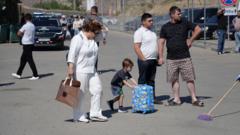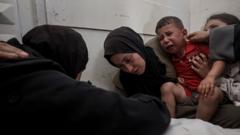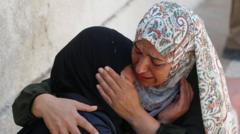The IDF's actions highlight significant military achievements against Iranian leadership involved with Hamas, as tensions continue to rise in the region.
Israel Claims Key Iranian Commander Killed in Strike Amid Ongoing Conflict

Israel Claims Key Iranian Commander Killed in Strike Amid Ongoing Conflict
Israel touts killing of Saeed Izadi, an integral figure in Hamas attacks, marking a pivotal moment in the escalating conflict.
Israel has announced the killing of Saeed Izadi, a prominent Iranian commander, in a targeted strike in Qom, Iran. According to the Israel Defense Forces (IDF), Izadi played a crucial role in orchestrating the Hamas attack that occurred on October 7, 2023, which resulted in the deaths of approximately 1,200 individuals and the abduction of several others to Gaza. IDF chief Eyal Zamir described the operation as a "tremendous intelligence and operational achievement," underscoring Izadi's connection to the violence, stating, "The blood of thousands of Israelis is on his hands."
So far, Iran has not confirmed the death of Izadi and has consistently denied its involvement in Hamas's assault on Israel. The IDF reported that Izadi was killed in the early hours of Saturday while in an apartment in Qom, south of Tehran. He had been responsible for managing relationships with Palestinian militant groups as part of his role with the Quds Force of the Iranian Revolutionary Guards Corps (IRGC). The IDF alleges that his contributions included arming and financing Hamas, as well as coordinating military strategies between IRGC commanders and Hamas leadership.
In a further development, Israel claimed responsibility for the killing of another Quds Force commander, Behnam Shahriyari, in a drone strike while he was traveling in a vehicle in western Iran. The IDF indicated that Shahriyari was tasked with the delivery of missiles and rockets to Iranian proxy factions, including Hamas and Hezbollah. If confirmed, these murders represent a substantial setback for the IRGC amid a fraying conflict.
The conflict has now stretched into its ninth day, with both sides conducting fresh attacks. Iran has accused Israel of targeting its nuclear facility near Isfahan, while Israeli officials reported strikes targeting military sites in southwestern Iran. Tensions escalated further with Iranian Foreign Minister Abbas Araghchi asserting that US involvement would be "very very dangerous" and reaffirming Iran's stance of halting nuclear program negotiations until Israel ceases its military strikes.
Estimates from Iranian officials suggest that at least 430 individuals, including military leaders, have died, with 3,500 injuries reported since hostilities erupted on June 13. An independent human rights watchdog, the Human Rights Activists News Agency, has reported an unofficial death toll of 657. In Israel, the casualty count stands at 25, which includes one individual who suffered a heart attack during the ongoing conflict.
So far, Iran has not confirmed the death of Izadi and has consistently denied its involvement in Hamas's assault on Israel. The IDF reported that Izadi was killed in the early hours of Saturday while in an apartment in Qom, south of Tehran. He had been responsible for managing relationships with Palestinian militant groups as part of his role with the Quds Force of the Iranian Revolutionary Guards Corps (IRGC). The IDF alleges that his contributions included arming and financing Hamas, as well as coordinating military strategies between IRGC commanders and Hamas leadership.
In a further development, Israel claimed responsibility for the killing of another Quds Force commander, Behnam Shahriyari, in a drone strike while he was traveling in a vehicle in western Iran. The IDF indicated that Shahriyari was tasked with the delivery of missiles and rockets to Iranian proxy factions, including Hamas and Hezbollah. If confirmed, these murders represent a substantial setback for the IRGC amid a fraying conflict.
The conflict has now stretched into its ninth day, with both sides conducting fresh attacks. Iran has accused Israel of targeting its nuclear facility near Isfahan, while Israeli officials reported strikes targeting military sites in southwestern Iran. Tensions escalated further with Iranian Foreign Minister Abbas Araghchi asserting that US involvement would be "very very dangerous" and reaffirming Iran's stance of halting nuclear program negotiations until Israel ceases its military strikes.
Estimates from Iranian officials suggest that at least 430 individuals, including military leaders, have died, with 3,500 injuries reported since hostilities erupted on June 13. An independent human rights watchdog, the Human Rights Activists News Agency, has reported an unofficial death toll of 657. In Israel, the casualty count stands at 25, which includes one individual who suffered a heart attack during the ongoing conflict.




















